IFComp 2008: Trein
Spoilers follow the break.
Read more »
Spoilers follow the break.
Read more »
Spoilers follow the break.
Read more »
Spoilers follow the break.
Read more »
Spoilers follow the break.
Read more »
Spoilers follow the break.
Read more »
A bit of déjà vu here: like last year, the first game on my docket is an Adrift game about the Grim Reaper. Only this time he’s the antagonist. Spoilers follow the break.
[ADDENDUM: It turns out that I’m mistaken about A Fine Day for Reaping being the first game I played for last year’s comp. It was the third.]
Read more »
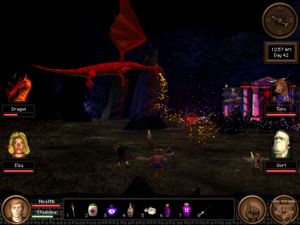 The point I was stuck on turned out to be decidedly lame: the only way to catch the assassin is to actually be attacked by him, and this only happens in one location, at night, if you enter from the right direction. I suppose the designers were thinking that players would naturally walk through that area on the way home from questioning people at the bar, but why walk when you can teleport? This is an example of a problem that plagues Sierra games in general: the problem of plot advancement depending on player actions that the player has no motivation to perform. And in fact it’s a fairly mild example, because once the assassin appeared, it was pretty clear what the trigger was. 1An example from another game that doesn’t share this property: In King’s Quest IV, visiting the wicked queen’s castle makes a whale appear in the ocean. You’re likely to trigger this once, because your initial exploration will include the castle, but if you restart the game, you’re likely to avoid the castle, because you’ve learned that there’s a limit to how many times you can visit it safely. And then you’ll be confused about the whale’s absence, because you weren’t aware of doing anything special to make it appear the first time. Mild enough, anyway, for me to get through it.
The point I was stuck on turned out to be decidedly lame: the only way to catch the assassin is to actually be attacked by him, and this only happens in one location, at night, if you enter from the right direction. I suppose the designers were thinking that players would naturally walk through that area on the way home from questioning people at the bar, but why walk when you can teleport? This is an example of a problem that plagues Sierra games in general: the problem of plot advancement depending on player actions that the player has no motivation to perform. And in fact it’s a fairly mild example, because once the assassin appeared, it was pretty clear what the trigger was. 1An example from another game that doesn’t share this property: In King’s Quest IV, visiting the wicked queen’s castle makes a whale appear in the ocean. You’re likely to trigger this once, because your initial exploration will include the castle, but if you restart the game, you’re likely to avoid the castle, because you’ve learned that there’s a limit to how many times you can visit it safely. And then you’ll be confused about the whale’s absence, because you weren’t aware of doing anything special to make it appear the first time. Mild enough, anyway, for me to get through it.
Having gotten unstuck, I finished the game with all three base classes. (I haven’t even tried the Paladin yet. I may do so in the future, but even so, the game is now officially off the Stack.) And in all three, I had the full 1000 points. This didn’t work out quite like I expected: unlike earlier games in the series, the maximum score isn’t the total quantity of available points, but rather, the largest score allowed. You can keep racking up more Deeds in the endgame, each accompanied by the score-goes-up noise, but the displayed score never goes above 1000. Once I realized this, in my first endgame experience, I didn’t bother hunting down obscure points with the other characters, and was free to choose whatever wife I felt was appropriate for each of them, regardless of point value. 2In fact, it turns out that you can’t always choose Erana or Katrina. Neither of them is willing to mary a Thief.
The first class I finished with was the Wizard. This is because the Wizard is the game’s easiest class. Not the simplest, mind you — that would be the Fighter. The Wizard is much more complex than the fighter. Figuring out the Wizard’s strengths is more difficult, because there are so many more possibilities to try. But once you have a handle on them, you can just exploit them for all they’re worth, and that makes the game easy. Where the Fighter battles his way through Minos’ fortress — a risky, time-consuming process — and the Thief sneaks his way in — also time-consuming and risky, even if the risks are different — the Wizard can pretty much get away with casting Calm and sauntering through. That’s power, man: the ability to walk through a batlefield unmolested. And if you decide you like killing things, like I’ve said, the Wizard is overpowered there too. In the end, you’re joined by several NPCs who fight the dragon alongside you — and, despite my earlier doubts, it is a real battle fought in the game’s regular combat engine — but I can easily see the Wizard trouncing the dragon solo.
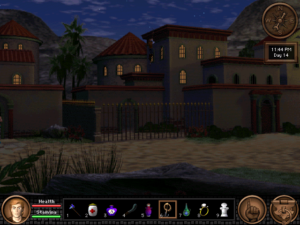 But while the Wizard is the easiest, and the quickest to play if you don’t restrain yourself, I think the Thief is the most engaging class this time round. It has a lot to do with the adoption of (simplified) stealth mechanics from other games: QfG5 was released the same year as Thief: The Dark Project and Metal Gear Solid, so it gives you a blackjack and a couple of fortresses full of guards patrolling in regular cycles or conveniently looking in the wrong direction. In previous QfG games, stealth was basically a matter of skill checks to see if people heard you plus a certain amount of special-cased hiding scenarios, not general line-of-sight stuff. Also, you get to sneak around on rooftops. I was always disappointed with the fact that QfG2 — the one in the “Arabian Nights” setting, which suggests Thief of Baghdad hijinks to me — didn’t have any satisfying rooftop escapades, but instead basically just repeated the kind of housebreaking you did in QfG1. So I’m pleased to see some of that here, even if it’s rather small.
But while the Wizard is the easiest, and the quickest to play if you don’t restrain yourself, I think the Thief is the most engaging class this time round. It has a lot to do with the adoption of (simplified) stealth mechanics from other games: QfG5 was released the same year as Thief: The Dark Project and Metal Gear Solid, so it gives you a blackjack and a couple of fortresses full of guards patrolling in regular cycles or conveniently looking in the wrong direction. In previous QfG games, stealth was basically a matter of skill checks to see if people heard you plus a certain amount of special-cased hiding scenarios, not general line-of-sight stuff. Also, you get to sneak around on rooftops. I was always disappointed with the fact that QfG2 — the one in the “Arabian Nights” setting, which suggests Thief of Baghdad hijinks to me — didn’t have any satisfying rooftop escapades, but instead basically just repeated the kind of housebreaking you did in QfG1. So I’m pleased to see some of that here, even if it’s rather small.
My one complaint about the Thief is actually a pretty large one. The Thief can’t always avoid combat. There are several mandatory fights, essentially boss fights that follow a bout of sneaking, and the Thief isn’t very good at them. Traditionally, the Thief’s combat method in the QfG series is to stand at a distance and throw knives, running away if necessary. But I found this unworkable in the new combat UI, so I wound up playing the mandatory combat basically like a less-powerful Fighter. Unfortunately, one of those encounters is with the dragon at the end. I mainly played support on that one in my Thief game, performing functions such as handing out equipment and convincing Gort to sacrifice himself.
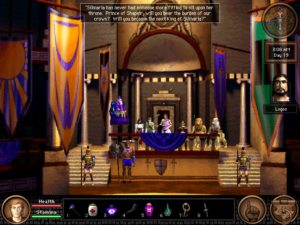 I had some trouble at first with the game crashing in or immediately after the final battle — consistently enough that I almost gave up before seeing the congratulations sequence. Either rebooting or playing from a different save helped, I’m not sure which. Anyway, it was anticlimactic. They obviously spent their cutscene budget on FMV scenes of the dragon. After it’s dead, you just have the player and a bunch of NPCs gathered in the throne room talking. You get to choose whether you want to actually be king or not 3If you choose not to become king, Elsa is chosen instead. So if you’re engaged to her at that point, you get to still live in a palace and everything without the duties of rulership., and your engagement (if any) is announced, and that’s it, unless you’re playing a Thief, in which case you can get an additional scene in the Thieves’ Guild where you’re proclaimed Chief Thief. If you choose to become king, you don’t even get a crown, or at least not where the player can see it. I want my crown! Sir Graham got a crown when he became king of Daventry. He had to pick it off his predecessor’s corpse himself, but it was a crown.
I had some trouble at first with the game crashing in or immediately after the final battle — consistently enough that I almost gave up before seeing the congratulations sequence. Either rebooting or playing from a different save helped, I’m not sure which. Anyway, it was anticlimactic. They obviously spent their cutscene budget on FMV scenes of the dragon. After it’s dead, you just have the player and a bunch of NPCs gathered in the throne room talking. You get to choose whether you want to actually be king or not 3If you choose not to become king, Elsa is chosen instead. So if you’re engaged to her at that point, you get to still live in a palace and everything without the duties of rulership., and your engagement (if any) is announced, and that’s it, unless you’re playing a Thief, in which case you can get an additional scene in the Thieves’ Guild where you’re proclaimed Chief Thief. If you choose to become king, you don’t even get a crown, or at least not where the player can see it. I want my crown! Sir Graham got a crown when he became king of Daventry. He had to pick it off his predecessor’s corpse himself, but it was a crown.
But then, all of the endings in the series were disappointments compared to the impact of the ending scene of the original QfG1: the celebration, the reiteration of prophetic verses that you understand now (with no mundane dialogue to spoil it; we’re in storytelling mode now), then the music transitions to the gentle Erana’s Peace theme while the credits roll over the hero and his new friends floating lazily on a magic carpet over the valley where the game took place — your first view of the valley as a whole! This is what you were saving, kids! And finally, the barest hint of what was to come in the forthcoming sequel. If there’s one element of this that I think would improve the ending to QfG5, it’s the shifting away from NPC dialogue to narrator voice. That’s what we really need at the end of an epic: something along the lines of “And so King Baf ruled wisely, and lived to an old age” or whatever.
I’ve spent a lot of time on this game now. Probably more than it deserves. I don’t try for perfect scores on every game I play, let alone perfect scores with every character class. I’m quite happy with my “43% complete” in GTA3. But I have some sentimental attachment to the QfG series. And as such, I don’t even feel qualified to say if anyone who doesn’t have my attachment to it should play it at all. It has its ups and downs (and silly clowns). I’ve been complaining about the bugs and gameplay issues a lot, but if nothing else, it has some really good music, always one of the high points of the series.
Next post: Something new. 4New to this blog, anyway.
| ↑1 | An example from another game that doesn’t share this property: In King’s Quest IV, visiting the wicked queen’s castle makes a whale appear in the ocean. You’re likely to trigger this once, because your initial exploration will include the castle, but if you restart the game, you’re likely to avoid the castle, because you’ve learned that there’s a limit to how many times you can visit it safely. And then you’ll be confused about the whale’s absence, because you weren’t aware of doing anything special to make it appear the first time. |
|---|---|
| ↑2 | In fact, it turns out that you can’t always choose Erana or Katrina. Neither of them is willing to mary a Thief. |
| ↑3 | If you choose not to become king, Elsa is chosen instead. So if you’re engaged to her at that point, you get to still live in a palace and everything without the duties of rulership. |
| ↑4 | New to this blog, anyway. |
I’ve been doing as much as I can with the Thief before starting the Rites. I expect the Rites will go fairly quickly once I start them, since I already know the puzzles for most of the game, will have most of my stats maximized already, and won’t have lengthy combat scenes slowing me down.
It turns out that the Thief does get a certain number of points for wrongdoing. I basically just hadn’t been aiming high enough. Why should a master thief be rewarded for pinching a vase from an empty house when there’s a bank vault to rob? I think I’ve gotten all the Thief-only points you can get pre-Rite, but it took some doing. Much of my gaming time since my last post was spent battling a bug that prevented the game from acknowledging one of my deeds.
The bug occurs when you try to learn pickpocketing, the new thief skill for this game. It’s not clear to me if picking pockets is ever actually worthwhile in gameplay terms — the loot you get is paltry, and accompanied by a hefty loss of Honor. But you get five points the first time you do it successfully, so clearly it’s a skill I have to learn. The Thieves’ Guild has the traditional practice dummy covered in bells, and training on it can also yield five points, in theory. (The Deeds list describes it as “Successfully pickpocket the dummy”, but in fact it seems to take several successes at increasing difficulty levels.)
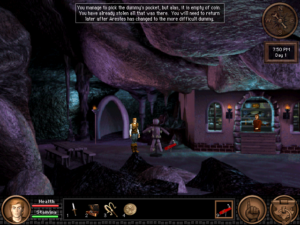 In the first session where I tried training on the dummy, I got my five points, but subsequently quit without saving. (I had gone on a pickpocketing spree as soon as I had the skill, resulting in no successes and unaccaptable loss of Honor.) Resuming later, I found that I could never get the coin from the dummy’s pocket: even when I avoided the bells, I was told that I had “already stolen all that was there”. I don’t know the exact cause — I had some theories, but they didn’t hold up under testing — but the dummy seems to sometimes get stuck in the “already picked” state if you fail to pick it on your first try in a visit. I ultimately got around this by training up my pickpocket skill before even trying it on the dummy, by repeatedly attempting to rob the guy tending shop in the guild hideout. (This never succeeds, but it’s a lot faster than training on the dummy, and doesn’t cost any Honor.)
In the first session where I tried training on the dummy, I got my five points, but subsequently quit without saving. (I had gone on a pickpocketing spree as soon as I had the skill, resulting in no successes and unaccaptable loss of Honor.) Resuming later, I found that I could never get the coin from the dummy’s pocket: even when I avoided the bells, I was told that I had “already stolen all that was there”. I don’t know the exact cause — I had some theories, but they didn’t hold up under testing — but the dummy seems to sometimes get stuck in the “already picked” state if you fail to pick it on your first try in a visit. I ultimately got around this by training up my pickpocket skill before even trying it on the dummy, by repeatedly attempting to rob the guy tending shop in the guild hideout. (This never succeeds, but it’s a lot faster than training on the dummy, and doesn’t cost any Honor.)
There are a lot of bugs in this game — more than I’d expect after applying patches by both its creators and its fans. I’ve mentioned a few: the problems with sound and video, the poor keyboard response that makes some combat options unusable. The game uses a set of custom mouse pointers (the appearance varying with context), but on my system the OS default mouse pointer overrides it. Quite by chance, I discovered that you can fix this by switching to another app with alt-tab and then switching back, so now that’s the first thing I do at the beginning of every session. Then there’s the probably-inadvertent imbalance of breath weapons, which are nearly instant death. This cuts both ways: the Wizard has a spell, “Frost Bite”, that acts like a breath weapon, making him basically invincible as long as his supply of mana potions holds out, but the Fighter has great difficulty getting his Fighter points for slaying dragonlike monsters. The Dragonlings, miniature dragons that swarm like bats, are particularly fearsome in this regard, because their breath has the strongest offensive capability imaginable: the ability to crash the game.
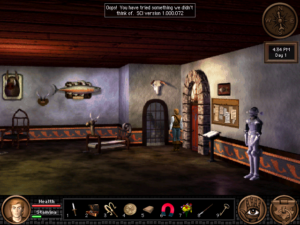 Those bugs are probably all consequences of playing the game on a sytem with specs years in advance of anything that the programmers could have tested on. Even the breath-weapon imbalance could well be a matter of not correcting for CPU speed correctly. There’s another class of bugs, game logic bugs that must have been present from day one, such as when you examine a mounted skull in the Adventurers’ Guild and get the response “Oops! You tried something we didn’t think of. SCI version 1.000.072”. For the most part, these are minor things, and easily detectable when they happen.
Those bugs are probably all consequences of playing the game on a sytem with specs years in advance of anything that the programmers could have tested on. Even the breath-weapon imbalance could well be a matter of not correcting for CPU speed correctly. There’s another class of bugs, game logic bugs that must have been present from day one, such as when you examine a mounted skull in the Adventurers’ Guild and get the response “Oops! You tried something we didn’t think of. SCI version 1.000.072”. For the most part, these are minor things, and easily detectable when they happen.
The really insidious thing about the pickpocket-dummy bug is that it’s something that you wouldn’t necessarily notice when it happens. It’s only by luck that I managed to “successfully pickpocket the dummy” the first time. I could have easily played the rest of the game, and wound up wih 995 points and no clue about where to find the rest. Even worse is knowing that most players probably wouldn’t care. In trying to find help for the bug online, not only did I not find any suggestions, I found that the people asking for help with it were outnumbered by the people who said things like “Don’t bother learning Pickpocketing, it’s not worth it.” Which makes me doubt my points-as-motivation thesis somewhat. It seems they’re only a motivation for some people.
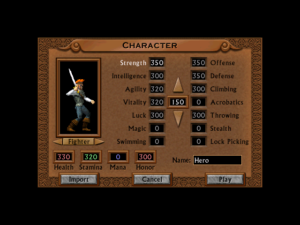 Every episode in the Quest for Glory series starts by giving the player a choice of three character classes: Fighter, Mage, and Thief. (From episode 3 onward, there’s a fourth character class, Paladin, but you can’t choose it at the beginning of the game. Paladinhood must be earned.) You choice of class affects not only how you deal with monsters, but how you can solve certain puzzles. There’s also class-specific content: guilds with their own tests, houses for the Thief to burglarize. All in all, it’s one of the most effective replay-value mechanisms I’ve seen. And yes, I have played through episodes 1 through 4 with every class. 1I have to admit, though, that part of the reason I played the first couple of games with every class is that I was just a kid then, without a Stack of 300+ games, and thus was more motivated to milk every drop of gameplay I could from those games I owned. Really, this whole blog is a holdover from that now-obsolete mindset.
Every episode in the Quest for Glory series starts by giving the player a choice of three character classes: Fighter, Mage, and Thief. (From episode 3 onward, there’s a fourth character class, Paladin, but you can’t choose it at the beginning of the game. Paladinhood must be earned.) You choice of class affects not only how you deal with monsters, but how you can solve certain puzzles. There’s also class-specific content: guilds with their own tests, houses for the Thief to burglarize. All in all, it’s one of the most effective replay-value mechanisms I’ve seen. And yes, I have played through episodes 1 through 4 with every class. 1I have to admit, though, that part of the reason I played the first couple of games with every class is that I was just a kid then, without a Stack of 300+ games, and thus was more motivated to milk every drop of gameplay I could from those games I owned. Really, this whole blog is a holdover from that now-obsolete mindset.
Generally speaking, the Fighter is the simplest class to play: whenever a puzzle has class-specific solutions, the Fighter’s solution is to break it. For that reason, I’ve been playing QfG5 as a Fighter so far. If I get completely stuck, I’ll give one of the other classes a whirl, and probably learn something to help the Fighter in the process. But that hasn’t happened yet.
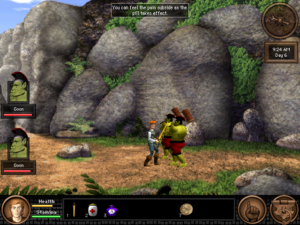 Playing the Fighter means I have to use the new combat system a great deal, and it has some problems. See, combat is realtime — in a sense, the game isn’t just an adventure/RPG hybrid, it’s an adventure/RPG/fighting game hybrid. You can do simple maneuvers with the mouse, Diablo-style, but if you want to use more than one kind of blow, or dodge sideways when your opponent strikes and counterattack, or even just block with your shield, you need to use the keyboard. The problem is that the game frequently drops keyboard events. I wouldn’t even mind this so much if it just dropped key presses, but it often fails to recognize key releases, leaving me endlessly dodging in a circle or whatever until I mash the key that triggered it a few times. So I’m pretty much stuck with the mouse. The fighter can pretty much just bash through things without fancy footwork, given enough healing items (and healing items are really cheap in this game), but there are some monsters that are patently designed to be handled with more finesse. The Goons, for example: big green guys with huge mallets. 2There was a Goon in QfG1. There, it was an invincible guard, something that ended the game abruptly without a combat sequence if it caught you. The fact that the hero is taking on whole packs of them now is a pretty clear sign to the fans of the series of how far he’s come. They hit hard, but their blows are kind of slow, and I could use that against them if I had access to the moves I’m supposed to have.
Playing the Fighter means I have to use the new combat system a great deal, and it has some problems. See, combat is realtime — in a sense, the game isn’t just an adventure/RPG hybrid, it’s an adventure/RPG/fighting game hybrid. You can do simple maneuvers with the mouse, Diablo-style, but if you want to use more than one kind of blow, or dodge sideways when your opponent strikes and counterattack, or even just block with your shield, you need to use the keyboard. The problem is that the game frequently drops keyboard events. I wouldn’t even mind this so much if it just dropped key presses, but it often fails to recognize key releases, leaving me endlessly dodging in a circle or whatever until I mash the key that triggered it a few times. So I’m pretty much stuck with the mouse. The fighter can pretty much just bash through things without fancy footwork, given enough healing items (and healing items are really cheap in this game), but there are some monsters that are patently designed to be handled with more finesse. The Goons, for example: big green guys with huge mallets. 2There was a Goon in QfG1. There, it was an invincible guard, something that ended the game abruptly without a combat sequence if it caught you. The fact that the hero is taking on whole packs of them now is a pretty clear sign to the fans of the series of how far he’s come. They hit hard, but their blows are kind of slow, and I could use that against them if I had access to the moves I’m supposed to have.
I wonder if the other classes will have it better or worse in that regard? On the one hand, in close combat, they’d be more reliant on dodging. On the other hand, they’re also more geared toward avoiding close combat.
| ↑1 | I have to admit, though, that part of the reason I played the first couple of games with every class is that I was just a kid then, without a Stack of 300+ games, and thus was more motivated to milk every drop of gameplay I could from those games I owned. Really, this whole blog is a holdover from that now-obsolete mindset. |
|---|---|
| ↑2 | There was a Goon in QfG1. There, it was an invincible guard, something that ended the game abruptly without a combat sequence if it caught you. The fact that the hero is taking on whole packs of them now is a pretty clear sign to the fans of the series of how far he’s come. |
So, the comp is well and truly over for the year. The results are up. Lost Pig took first place, followed by An Act of Murder and Lord Bellwater’s Secret, an unusually strong showing for mysteries this year. Last place was taken by Paul Allen Panks, surprising no one, with his sole surviving game: of the three he entered, two were disqualified for violating comp rules. And somewhere in the middle, Deadline Enchanter took the Golden Banana of Discord, the unofficial award for the game whose votes had the largest standard deviation. I take a personal interest in the Banana, because my own 2001 entry, The Gostak, holds the record for highest standard deviation ever. I rated Deadline Enchanter low myself, but it certainly deserves the banana, being hard to understand and breaking convention as it does. I would have been disappointed if the award had gone to its runner-up, Gathered in Darkness, which is relatively normal and seems to have gotten as high a standard deviation as it did simply by only being playable under Windows and thus getting fewer votes than most games.
On the whole, this year’s comp seems substandard to me. Perhaps I’m growing curmudgeonly and difficult to satisfy, but I gave out no tens and an awful lot of threes. I think I lowered my standards as I went along — a few of the earlier games on my list, including Lost Pig, definitely got rated lower than I would have rated them later. This is why it’s important to play the comp games in a random order: to even out effects like that.
If this year’s comp has an overall theme, it’s inadequate testing. Several games were so buggy that I cannot believe that they had been tested at all, and one was acknowledged by the author to be outright impossible to win. This is a shame, and I have to accept part of the blame for it. One of the differences between amateur and professional game development is that professional outfits can be reasonably expected to hire testers. Amateur games have to rely on volunteers, and the sad fact is that finding volunteers with enough IF experience to give your game a meaningful workout is hard, especially as the comp deadline draws near. In the past, there have been some online resources to help authors find testers, but I don’t know if they’re still being maintained.
Writing criticism is always a little arrogant. Creating is hard, finding fault is easy. So it’s particularly shameful that we who criticize fail to do what we can to find fault before release, when it’ll be helpful. So, rather than just gripe, I intend to do something about it. I intend to test some games, and do it thoroughly as I am able. At minimum, I want to be a tester for at least ten of next year’s comp entries, and also as many works not entered in the comp as I can manage. Next summer, I will actively pursue entrants and badger them to give me beta copies of their games. This is my promise, and I make it here in front of everybody so I won’t have any excuse for forgetting it.